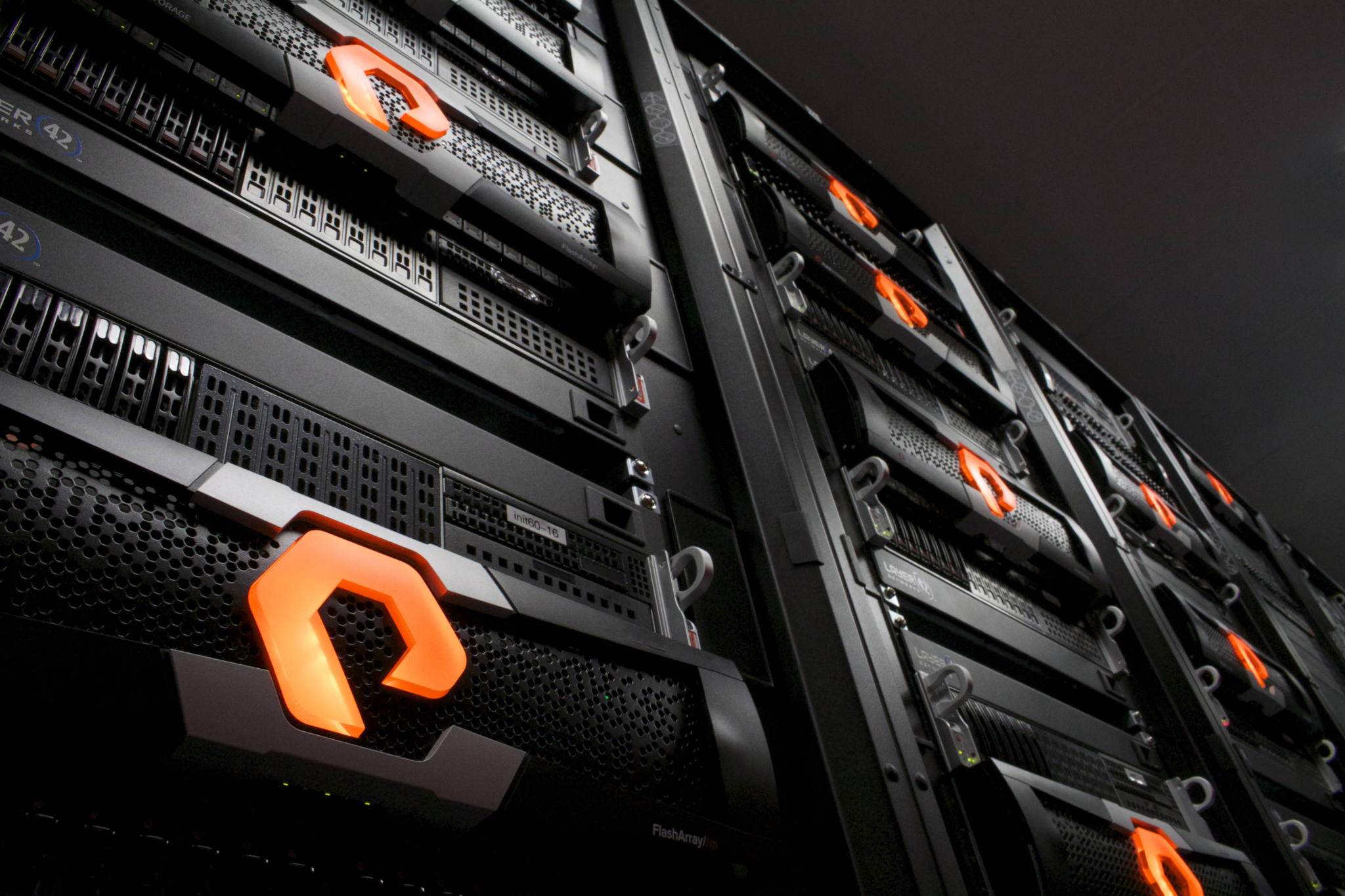 INFRA
INFRA
 INFRA
INFRA
 INFRA
INFRA
Pure Storage Inc. is expanding its product portfolio with three new flash arrays and a set of software features designed to mitigate the impact of ransomware attacks.
The company announced the offerings at its annual Pure//Accenture event in Las Vegas, which kicked off this morning.
The first two additions to the hardware maker’s product portfolio are the FlashArray//C R4 and FlashArray//X R4 storage systems. Pure Storage says customers can expect an up to 40% increase in performance compared with earlier-generation gear. Additionally, the company is promising an up to 74% lower total cost of ownership.
The first new appliance, the FlashArray//C R4, is rolling out to Pure Storage’s FlashArray//C series of storage systems. The systems are geared toward workloads that require a balance between performance and cost efficiency. According to Pure Storage, the product series’ pricing is designed to be competitive with hybrid arrays, affordable storage systems that combine flash and disk.
The second new system that debuted today, the FlashArray//X R4, will expand a different Pure Storage product series called the FlashArray//X. It’s a lineup of performance-optimized arrays designed to run a company’s most demanding applications.
The two new systems are both based on central processing units from Intel Corp.’s latest-generation Xeon chip series. They also use DDR5, the newest type of DRAM memory on the market.
According to Pure Storage, the systems provide up to 80% higher memory speeds than earlier hardware. Furthermore, the company has added a data compression tool it describes as 30% more efficient than its previous-generation software. The tool will enable customers to store more data in their arrays.
Alongside the capabilities that are shared by the FlashArray//X R4 and FlashArray//C R4, Pure Storage today detailed a number of system-specific features.
The FlashArray//C R4 is designed to be equipped with 75-terabyte flash modules. Those modules are based on QLC memory, a type of capacity-optimized flash. In general, QLC systems can store more information than a comparably-sized device equipped with other types of solid-state memory.
FlashArray//C R4’s 75-terabyte modules also include so-called NVRAM. That’s a specialized type of RAM used to increase the performance of storage arrays.
NVRAM is faster than flash, which means it can speed up certain data operations. Systems equipped with the technology don’t write data directly to flash but rather reroute it to the onboard RAM, which reduces latency. Later, after the initial write operation is complete, the system moves the data from RAM to permanent storage.
The FlashArray//X R4, the second new system Pure Storage announced today, doesn’t use the same 75-terabyte modules as the FlashArray//C R4. Rather, it’s designed to be equipped with 35-terabyte modules based on TLC flash. TLC is a type of solid-state memory that can’t store as much data as the QLC variety used by the FlashArray//C, but offers considerably faster performance.
“With FlashArray //X and //C R4 models, we’re enabling all-flash at the cost of disk, but without the costs of disk and introducing a new era where data is always at the ready,” said Shawn Hansen, vice president and general manager of Pure Storage’s FlashArray business.
The two arrays are rolling out alongside a third flash system Pure Storage calls the FlashArray//E. It’s a cost-optimized appliance positioned as an alternative to traditional disk storage. According to Pure Storage, the FlashArray//E requires 80% less power and space than traditional disk-based alternatives.
The system is an enhanced version of a product called FlashBlade//E that the company debuted in March. The latter system ships with an initial capacity of four petabytes that customers can increase in 2-petabyte increments. The new FlashArray//E has a considerably lower starting capacity of 1 petabyte, which should make it more accessible for companies with limited hardware requirements.
The FlashArray//E is based on 75-terabyte QLC flash modules. According to Pure Storage, customers can expect a cost of less than 20 cents per gigabyte. The company is also promising a 65% reduction in operating costs, a term that covers maintenance-related expenses, compared with disk-based storage systems.
“Legacy disk solutions, marked by high costs, massive data center space requirements, and inefficient energy usage, are ill-equipped to support the evolving needs of today’s modern enterprises,” said Pure Storage Chief Product Officer Ajay Singh.
Pure Storage debuted the new hardware alongside a set of product enhancements designed to reduce the risk posed by ransomware. The first of those enhancements is rolling out to Evergreen//One, the company’s subscription-based storage offering. The offering allows companies to buy flash arrays for a monthly fee instead of purchasing everything upfront.
Pure Storage is adding an optional ransomware recovery add-on to the subscription. In the event of a ransomware attack, customers can have the company ship new flash arrays to their data centers on the next business day. Moreover, Pure Storage promises to prepare a recovery plan within 48 hours.
In conjunction, the company is enhancing the existing ransomware protection features of its Pure1 platform, which helps administrators manage storage arrays. The platform can now more effectively detect malicious attempts to modify a company’s data. Pure1 customers are also receiving access to an assessment tool that can evaluate how well their storage arrays’ configuration adheres to data protection best practices.
THANK YOU